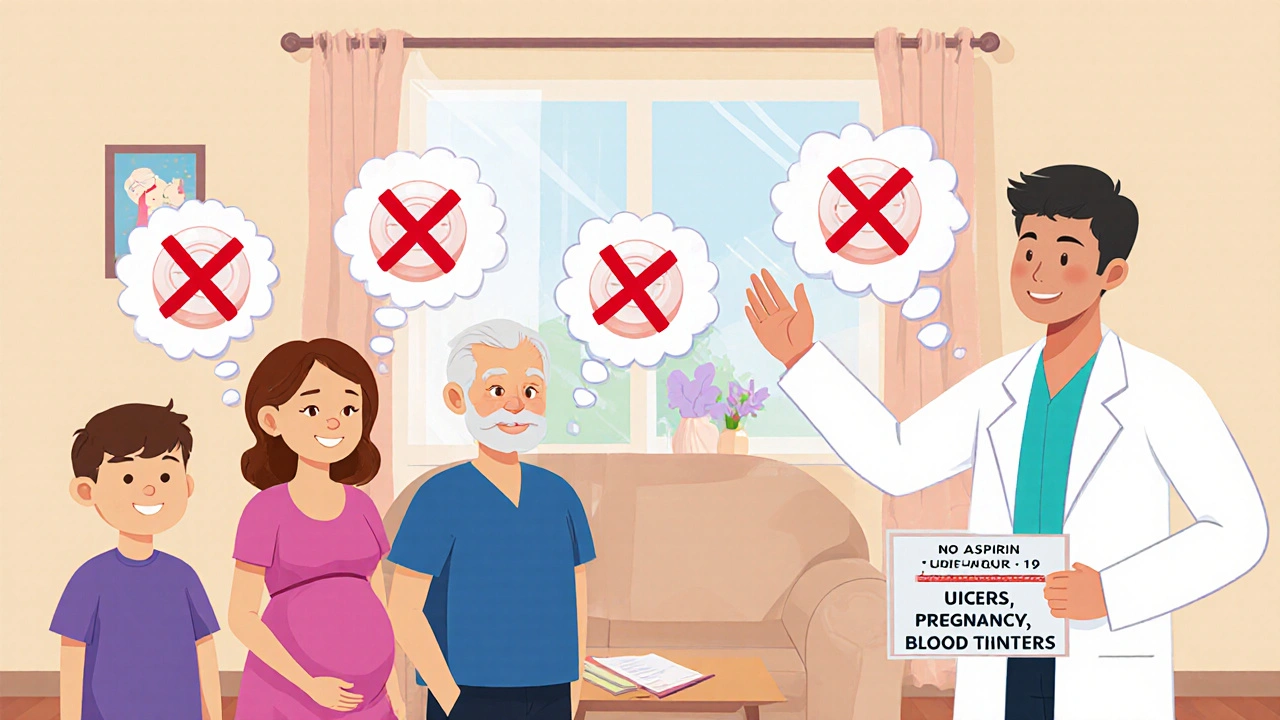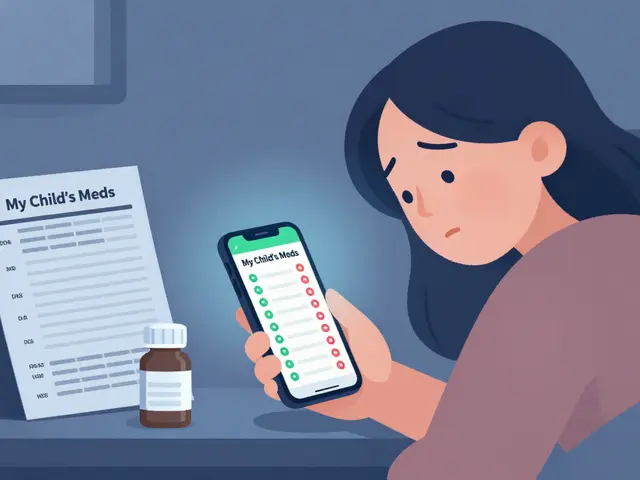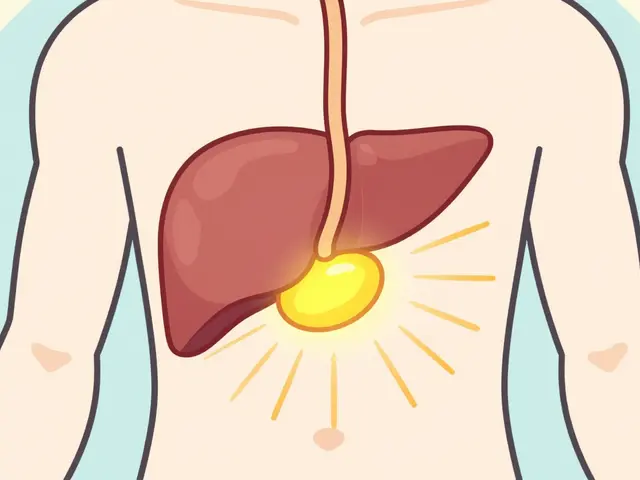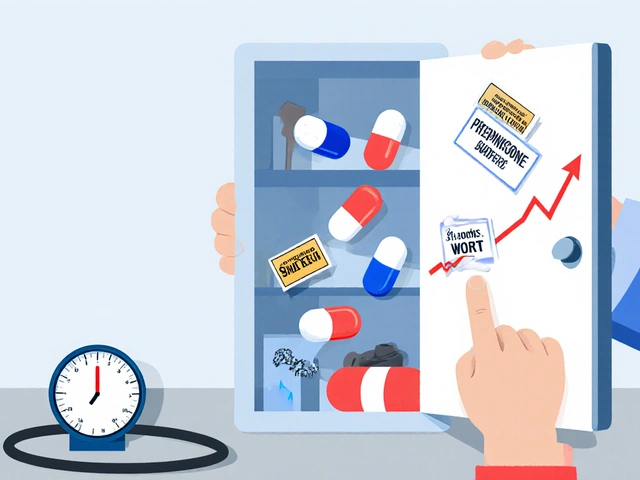
Key Takeaways
- Aspirin can lower fever and ease mild aches, but it does not treat the viruses that cause colds or flu.
- Side‑effects such as stomach irritation, bleeding risk, and kidney strain are higher in children, teenagers, and people with certain health conditions.
- For most cold‑and‑flu symptoms, ibuprofen or acetaminophen often provide similar pain relief with a better safety profile for younger users.
- Always follow dosage guidelines and avoid aspirin if you have a history of ulcers, bleeding disorders, or are taking blood‑thinners.
- Consult a healthcare professional before giving aspirin to anyone under 19 years old.
When a sniffle turns into a full‑blown flu, the first thing many of us reach for is a bottle of pain reliever. Aspirin is a classic over‑the‑counter drug that promises to melt away headache, lower fever, and make you feel a bit more human. But does it actually help when you’re battling a cold or the flu? Let’s break down the science, compare it to the other households staples, and see where the real risks lie.
How Aspirin Works: The Science in Simple Terms
Aspirin’s active ingredient is acetylsalicylic acid. It belongs to the non‑steroidal anti‑inflammatory drug (NSAID) family. The drug blocks enzymes called cyclooxygenases (COX‑1 and COX‑2). These enzymes are responsible for making prostaglandins-chemicals that cause pain, fever, and inflammation. By limiting prostaglandin production, aspirin reduces the body’s temperature set‑point in the brain and dulls the pain signals that make a head‑ache feel like a hammer.
What aspirin does not do is attack the viruses that cause colds or influenza. It merely eases the symptoms that the viruses trigger.
What the Evidence Says About Cold and Flu Relief
Clinical trials on aspirin for viral respiratory infections are sparse because the drug is already well‑known for other uses. However, a few key points emerge from the data:
- Fever reduction: Multiple small studies show that a 325‑mg dose of aspirin can lower fever by 1-2 °C within an hour, comparable to other NSAIDs.
- Headache and muscle aches: Aspirin’s analgesic effect works for viral‑induced aches, but it is not superior to ibuprofen or acetaminophen.
- Duration of illness: No study demonstrates that aspirin shortens the overall course of a cold or flu.
- Complication rates: In children and teens, aspirin use is linked to Reye’s syndrome-a rare but fatal brain‑liver condition. This risk alone makes many health authorities advise against aspirin in anyone under 19, unless prescribed for a specific condition.
Bottom line: Aspirin can manage fever and mild pain, but it won’t speed up recovery.
How Aspirin Stacks Up Against Other OTC Options
Most people have three go‑to choices for cold‑and‑flu symptoms: aspirin, ibuprofen, and acetaminophen. The table below compares them on the most relevant factors.
| Attribute | Aspirin | Ibuprofen | Acetaminophen |
|---|---|---|---|
| Primary action | NSAID - COX inhibition | NSAID - COX inhibition (more COX‑2) | Analgesic/antipyretic - central COX inhibition |
| Effective for fever | ✓ | ✓ | ✓ |
| Effective for headache/muscle aches | ✓ | ✓ (often stronger) | ✓ (milder) |
| Risk of stomach irritation | High (especially without food) | Moderate | Low |
| Bleeding risk | High (platelet inhibition) | Low‑moderate | None |
| Kidney safety | Potentially reduced renal perfusion at high doses | Similar concern at high doses | Generally safe |
| Not recommended for children under 19 | ✓ (due to Reye’s syndrome) | ✗ (generally safe) | ✗ (generally safe) |
| Typical adult dose for fever | 325‑650 mg every 4‑6 h (max 4 g/24 h) | 200‑400 mg every 4‑6 h (max 1.2 g/24 h) | 500‑1000 mg every 4‑6 h (max 4 g/24 h) |
Safety Concerns: Who Should Skip Aspirin?
Even though aspirin is over‑the‑counter, it’s not a one‑size‑fits‑all remedy. Keep an eye on these red flags:
- Children and teenagers with viral infections - risk of Reye’s syndrome.
- People with a history of stomach ulcers or gastritis - aspirin’s acid‑producing effect can reignite bleeding.
- Those on anticoagulant therapy (warfarin, direct oral anticoagulants) - added platelet inhibition raises bleeding odds.
- Pregnant women in the third trimester - aspirin can affect fetal circulation.
- Patients with chronic kidney disease - NSAIDs can worsen renal function.
If any of these apply, opt for acetaminophen or talk to a pharmacist before taking aspirin.

Dosage Guidelines: Getting It Right
- Adults (age 19+): 325 mg to 650 mg every 4‑6 hours as needed. Do not exceed 4 g in 24 hours.
- Older adults (65+): Consider the lower end of the range (325 mg) to reduce GI risk.
- Take with food or a full glass of milk to cushion the stomach lining.
- Avoid alcohol while taking aspirin, as both irritate the stomach and increase bleeding risk.
- Never combine with other NSAIDs (e.g., ibuprofen) unless a doctor tells you to.
When you’re sick, the goal is to feel tolerable, not to mask every symptom. If fever stays above 39 °C (102.2 °F) after two doses, or if pain worsens, seek medical advice.
When to Choose Another Medication
If you’re looking for the least risky way to control a cold or flu, here’s a quick decision guide:
- Kids under 12: Stick with pediatric‑formulated acetaminophen or ibuprofen. No aspirin.
- Stomach‑sensitive adults: Acetaminophen is gentler on the gut.
- Inflammation‑heavy symptoms (muscle aches, sore throat): Ibuprofen may give stronger relief.
- Already on a blood‑thinner: Choose acetaminophen or talk to your doctor about a safe NSAID.
Frequently Asked Questions
Can aspirin prevent a cold from getting worse?
No. Aspirin only eases fever and pain. It does not affect the viruses that cause colds or flu, so it won’t shorten the illness.
Is it safe to take aspirin while I have the flu?
For most healthy adults, a short‑term dose for fever is safe. However, avoid it if you have ulcers, are on blood thinners, or are pregnant in the third trimester.
Why do doctors warn kids against aspirin?
Aspirin has been linked to Reye’s syndrome, a rare but deadly brain‑liver condition that occurs in children recovering from viral infections.
Can I combine aspirin with other cold medicines?
Only if the other product doesn’t already contain an NSAID or acetaminophen. Mixing can lead to accidental overdose or increased side‑effects.
What’s the best OTC option for a teenager with a fever?
Acetaminophen or ibuprofen is preferred because they carry no risk of Reye’s syndrome. Follow the dosing chart on the package and keep the total daily dose within limits.
Ultimately, aspirin can be a handy tool for easing fever and aches, but it’s far from a cure‑all for colds or flu. Weigh the benefits against the bleeding and stomach risks, especially for younger people, and consider gentler alternatives when appropriate.
14 Comments
eko lennon
October 30, 2025 AT 19:25 PM
When the flu hits you like a freight train, you reach for aspirin like it's a magic wand, and then reality slams you in the face with a gut‑wrenching twist that could have been avoided. You start with a hopeful dose, feeling like you’ve wrestled the fever into submission, only to watch it flare up again like a phoenix that refuses to stay down. Your stomach protests, bubbling and burning, as if a small army has taken up residence behind your ribs, and you realize the cheap relief came with a hidden cost. The next morning, you’re scrolling through endless forums, bombarded by warnings about Reye’s syndrome, bleeding, and ulcers, and the dread curls around your thoughts like a cold fog. You recall the table that listed ibuprofen as a gentler giant, yet you cling to aspirin because it’s the one you grew up with, the one your grandmother swore by. Suddenly you feel like a reluctant hero battling a microscopic enemy with the wrong weapon, a warrior in a flawed armor. The side effects start to echo in your mind: “Did I just gamble with my liver?” you ask, and the silence answers back with a mocking grin. Friends start to chime in, some with lofty medical jargon, others with dismissive jokes, and you’re left sorting through a maze of misinformation. Each anecdote feels like a siren’s call, pulling you deeper into uncertainty, and you wonder if you’ve become a pawn in a pharmaceutical chess game. The drama of it all builds as you try to balance a feverish head with a queasy gut, the stakes rising with every pill you swallow. By evening, you’re reading about NSAIDs, COX‑1 and COX‑2 pathways, and the words swirl like a storm of academic prose you never signed up for. You’re haunted by the thought that maybe a simple acetaminophen could have saved you the angst, but the habit is too strong. The tension peaks when you finally decide to ditch the aspirin, feeling both victorious and guilty for abandoning a familiar friend. You close the medicine cabinet, the clink of the bottle echoing like a final curtain, and you breathe a sigh of relief that’s part triumph, part trepidation. In the end, the virus runs its course, indifferent to your choices, while you learn that the drama isn’t in the illness but in the pills you choose to wield.
Sunita Basnet
November 4, 2025 AT 19:25 PM
Stay positive and remember that NSAID like aspirin works by blocking COX enzymes. The key is to manage fever not to eradicate viruses. Optimize your regimen by taking the tablet with food to protect gastric mucosa. Consider ibuprofen for stronger anti‑inflammatory effect and acetaminophen for low GI risk. Collaborate with your pharmacist for dosage optimization.
Melody Barton
November 9, 2025 AT 19:25 PM
Listen up, if you’re sensitive to stomach pain then ditch aspirin right now. It’s a blunt tool that can tear your lining and bleed you out. Choose acetaminophen for a gentle touch or ibuprofen if you need that extra punch. Don’t be lazy about reading the label, it could save your life.
Justin Scherer
November 14, 2025 AT 19:25 PM
That article nails the basics, but I’d add that the timing of doses matters too. Spacing aspirin four to six hours apart keeps your plasma levels stable and avoids peaks that irritate the gut. Also, watch out for hidden NSAIDs in combination cold meds, they can double‑dose you unintentionally. Overall, moderation and awareness are the real keys.
Pamela Clark
November 19, 2025 AT 19:25 PM
Oh, brilliant, another piece telling us aspirin “works” like it’s a revelation. As if we needed a masterclass from a pharmacy aisle. The risks are so obvious, I'd guess even a toddler could list them. Guess we’ll all keep popping pills because we love living on the edge.
Diane Holding
November 24, 2025 AT 19:25 PM
Skip aspirin for kids, stick to pediatric‑safe meds.
Manish Verma
November 29, 2025 AT 19:25 PM
Look mates, our health system already pushes the safest options, so why gamble with aspirin when the good ol’ American pharmacy shelves are stocked with ibuprofen and Tylenol? Keep it simple, keep it safe, keep it home‑grown.
Edward Brown
December 4, 2025 AT 19:25 PM
They hide the real purpose of aspirin behind a veneer of harmlessness. The data on bleeding risk is suppressed by big pharma. Every OTC aisle is a frontline in a silent experiment. Wake up and question what you swallow.
ALBERT HENDERSHOT JR.
December 9, 2025 AT 19:25 PM
Thank you for the thorough overview. It’s crucial that readers understand both efficacy and safety profiles. I would recommend emphasizing the importance of consulting a healthcare professional before mixing aspirin with anticoagulants. 😊
Cheyanne Moxley
December 14, 2025 AT 19:25 PM
Seriously, if you’re still bragging about taking aspirin while you know the risks, you’re just being reckless. No one wants to hear excuses about “it’s just a little pain.” Own up to the science and stop spreading misinformation.
Kevin Stratton
December 19, 2025 AT 19:25 PM
Contemplating pain relief reminds us that even a tiny tablet carries weighty ethical considerations. 🍃
Lionel du Plessis
December 24, 2025 AT 19:25 PM
Observing the OTC market reveals a clear dominance of NSAID formulations, aspirin still holds a niche due to its irreversible platelet inhibition profile. From a pharmacokinetic standpoint, its longer half‑life offers occasional convenience but at the cost of gastrointestinal integrity. Users seem indifferent to these trade‑offs unless adverse events surface.
Andrae Powel
December 29, 2025 AT 19:25 PM
Great summary, everyone. To add a practical tip: if you’re on a blood thinner, avoid aspirin entirely and opt for acetaminophen for fever control. For those with ulcer history, take aspirin with food and a proton‑pump inhibitor if needed. Always read the label and consult your doctor if you have chronic conditions.






Octavia Clahar
October 25, 2025 AT 20:25 PM
Honestly, I've seen way too many people pop aspirin at the first sign of a sniffle and then wonder why they're still feeling miserable. It's like they think a pill can chase the virus away, which it can't. The drug does a decent job knocking down a fever, but it doesn't touch the underlying infection. If you have a stomach ulcer or are on a blood‑ thinner, you’re basically asking for trouble. So, my friendly advice: stick to ibuprofen or acetaminophen unless you have a solid reason to reach for aspirin.